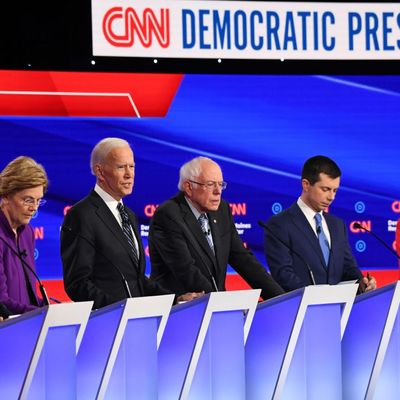
The American labor movement has been under attack for decades, but you wouldn’t know it from watching the Democratic primary debates. On Tuesday evening, moderators mentioned unions once — specifically a labor federation, the AFL-CIO, and only to ask Bernie Sanders why he opposed the USMCA trade deal that the union endorsed. This meager exchange is still something of an improvement on most previous debates. When unions have come up at all, it’s usually thanks to the candidates, who invoke “good union jobs” to polish their economic proposals or to criticize Medicare for All.
To date, debate moderators themselves have not asked candidates a single direct question about labor rights. That’s a serious oversight, and it should be remedied by the moderators of the next Democratic debate in February. If they don’t, not only will they misjudge the true import of the debate’s location — in Las Vegas, the home of the powerful Culinary Workers union — they’ll miss the point of the debates themselves. These monthly spectacles are supposed to have a purpose: They’re opportunities for voters to hear from candidates on the most urgent issues of our time.
Instead, we’ve endured months of barely distinguishable debates marked by nearly identical questions about Medicare for All. Certainly no one would seriously dispute that health-care reform is important; it is both a priority for voters and a litmus test distinguishing the field’s progressives from its moderates. But unions merit at least a fraction of the same attention. Good union jobs really are in decline. From 2018 to 2019, a mere 10 percent of all employed Americans said they belonged to a union, Gallup reported last August, down from 20.1 percent in 1983. Union losses are concentrated in the private sector, where only 6 percent of workers are union members. Those figures stand in sharp contrast with the U.K., where just over 23 percent of the overall workforce belonged to unions in 2018, a category that includes 13.4 percent of private-sector workers.
The U.S. has such low rates of union membership largely because its labor laws are much weaker than those of many other developed nations. The Taft-Hartley Act of 1947 substantially restricted the rights of unions and expanded those of employers. Decades of right-to-work laws followed its passage, sapping the labor movement’s former strength until it reached its present state of decline. The labor movement isn’t dead; workers still unionize, strike, and win important gains, as the teachers-strike wave helps prove. But the movement’s woes demand swift attention from the next president of the United States, and debate moderators should ask candidates about their plans.
Ask them to explain the decline in union membership. They should be able to clearly identify the laws and organizations responsible for bankrolling the legal cases, policies, and politicians responsible for stripping labor rights from American workers. Ask them about the PRO Act, introduced in the House last May. Some candidates co-sponsored the bill, which would repeal portions of Taft-Hartley; others aren’t in Congress, and their positions are not as well known. What would they do to expand collective bargaining rights and the right to strike? Would they extend organizing rights to domestic workers? To farmworkers? Are they really willing to rein in the privileges legislators have granted to employers? How would they make sure that employers can’t drag out the bargaining process for months and even years? These would all be important questions even if there weren’t two billionaire businessmen in the race, but the presence of Tom Steyer and Michael Bloomberg creates additional urgency. If the rich are going to try to buy the presidency, the press ought to fulfill its basic function and hold them to account. Make them explain what, if anything, they’d do to protect the rights of American workers.
Union density may sound like an esoteric subject. But it has dramatic real-world consequences for working people. Research connects the nation’s decline in union membership to an overall rise in income inequality. Put in simpler, debate-ready terms, workers suffer when unions suffer. Voters deserve to know if candidates understand that connection.
This post has been updated to clarify the nature of the AFL-CIO.






























